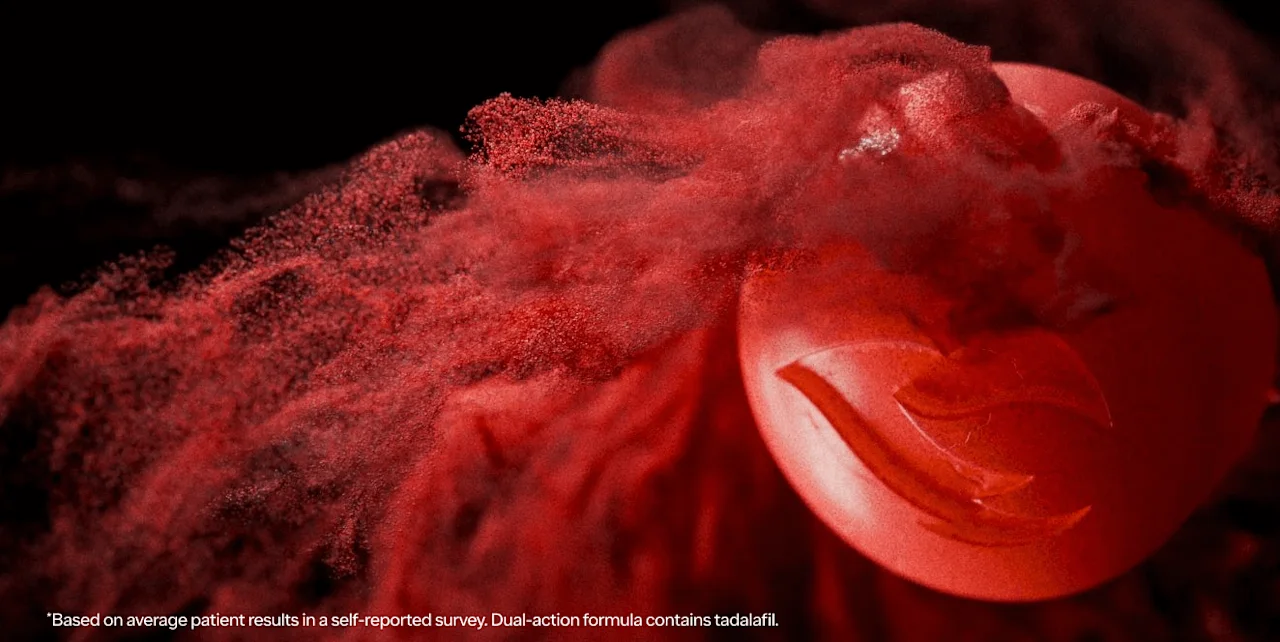Key takeaways
Some vitamins and supplements (for example, vitamins B3 and D or L-arginine) may support erectile function and contribute to overall sexual health.
While evidence is limited, there’s no definitive proof that supplements can effectively treat ED.
Other options for treating ED include lifestyle changes, prescription medications, and even surgery.
Here's what we'll cover
Here's what we'll cover
Here's what we'll cover
Key takeaways
Some vitamins and supplements (for example, vitamins B3 and D or L-arginine) may support erectile function and contribute to overall sexual health.
While evidence is limited, there’s no definitive proof that supplements can effectively treat ED.
Other options for treating ED include lifestyle changes, prescription medications, and even surgery.
Many men with erectile dysfunction (ED) are searching for ways to get stronger, more reliable erections. And it’s natural to wonder whether there are any vitamins for ED that could help. The answer? It’s a bit nuanced.
In most cases, prescription medication is the primary treatment for ED, but some vitamins (such as vitamin D and B12) may support erectile health when you are deficient, especially when combined with other ED treatments or lifestyle changes.
It’s true that vitamins can play a role in things like blood flow, testosterone levels, and even your mood—all of which can affect your ability to get and keep an erection. While vitamins have not been studied as extensively as prescription medications, there may still be a role for supplementation in your ED routine. In this article, we’ll break down the best vitamins for ED, what the science says about them, and how they might fit into your overall plan for better sexual health.
Can vitamins treat ED?
If your erectile dysfunction is specifically linked to a vitamin deficiency, then vitamins can play a supporting role in treating ED, but they should not be considered a substitute for prescription medication.
“Correcting a deficiency—particularly in nutrients like vitamin D or B12—can sometimes improve erectile function,” says Justin Houman, MD, FACS of Tower Urology at Cedars-Sinai Medical Center. “However, they’re not a substitute for medical treatment when ED is caused by vascular disease, nerve issues, or hormonal imbalances.”
Erectile dysfunction can have a variety of causes, including physical conditions like high cholesterol, diabetes, or heart disease, as well as psychological factors like anxiety or depression. It can also be a side effect of certain medications, including some antidepressants and blood pressure drugs.
Best vitamins for ED
Some vitamins have been linked to better erectile function, especially in people who were deficient and then corrected that deficiency.
Here are a few vitamins that may play a role in supporting erections:
Vitamin D
Vitamin B12
Vitamin C
Vitamin E
Vitamin B9 (folate)
Let’s dig into each one in detail.
Vitamin D
“Low levels of Vitamin D have been linked to ED,” Dr. Houman says. “This vitamin supports vascular health and testosterone production.”
A scientific review published in 2020 found that vitamin D is needed for adequate erectile function. Researchers analyzed multiple studies on how exactly vitamin D impacts erectile function and found it impacts the vascular system, nitric oxide production, the endocrine system, and the immune system, all of which play a role in making an erection happen.
Your body makes vitamin D when your skin is exposed to sunlight, and for most people, this is their biggest source of vitamin D. You can also get vitamin D through food, though only a few foods—like fatty fish (salmon, tuna), egg yolks, cheese, and certain mushrooms—naturally contain it. In the U.S., many products like milk, plant-based milks, yogurt, and breakfast cereals are fortified with vitamin D. It’s also widely available as a dietary supplement.
Vitamin B12
Vitamin B12 is important for nerve health and blood flow, which are both essential for erections, according to Dr. Houman. Consumption of vitamin B12 (along with vitamin B6 and folate) has been linked to decreased risks of ED among young, healthy men. However, a 2024 study found no significant correlation between vitamin B12 levels and ED, so more research is needed.
Vitamin B12 is found in animal-based foods like meat, fish, eggs, and dairy. It’s also available as a dietary supplement or, in some cases, as a prescription injection given directly into the muscle.
Vitamin C
Vitamin C has a long list of benefits: It supports the immune system, may lower the risk of certain chronic illnesses, promotes heart health, and helps protect brain function. It can also support nitric oxide production, which helps blood vessels dilate—a key part of achieving and maintaining an erection.
Fruits and vegetables are the best sources of vitamin C. Red peppers, oranges, tomatoes, and potatoes are some of the top contributors. It’s also available as a dietary supplement.
Vitamin E
Perhaps a lesser-known vitamin, vitamin E may help with erections, too.
“[As] an antioxidant, Vitamin E may help reduce oxidative stress, which can affect vascular function,” says Dr. Houman.
In one small study, men who took a daily supplement containing vitamin E and ginseng saw improvements in erectile function after six weeks. Another study using an animal model found that vitamin E improved erectile function in older rats, though not as much as sildenafil (a common prescription ED medication).
Nuts, seeds, leafy greens, and vegetable oils are good sources of vitamin E, but it is also available as a dietary supplement.
Vitamin B9 (Folate)
Vitamin B9, also known as folate, has also been linked to erectile function. It plays a key role in several bodily processes, including the formation of new blood cells and sperm development. One small study found a connection between folate deficiency and ED. According to Dr. Houman, folate may also work alongside vitamin B12 to support healthy blood flow.
Folate is naturally found in a variety of foods, including vegetables, fruits, nuts, beans, seafood, eggs, meat, and grains. Foods especially high in vitamin B9 include spinach, asparagus, Brussels sprouts, and liver. It’s also added to enriched breads, cereals, pasta, rice, and other grain products.
Folate can be taken as a supplement alone (as folic acid) or as part of a multivitamin or B-complex vitamin.
Best supplements for ED
Similar to vitamins for ED, there are also some possible supplements and herbs that could help with erectile dysfunction.
The research on supplements and herbal remedies for ED is still emerging and, in many cases, pretty mixed. Some people may notice an improvement, while others may not see much of a difference.
That said, here are a few ED supplements that show some potential when it comes to supporting erectile function and overall sexual health:
Ginseng. Red Korean ginseng has been used in herbal medicine for centuries, including as a natural remedy for erectile dysfunction. A review of 24 randomized controlled clinical trials of herbal supplements found that ginseng was linked to improved erectile function, though more research is needed to confirm how effective it really is. Some researchers believe it may work by boosting nitric oxide production and helping blood vessels relax—similar to how some ED medications work. You can find ginseng in pills, capsules, powders, and teas.
DHEA. Dehydroepiandrosterone (DHEA) is a hormone produced in the adrenal glands, which are small glands that sit on top of your kidneys. DHEA boosts sex hormones like testosterone and estrogen. Some studies have found that taking a DHEA supplement can boost testosterone levels, a hormone associated with erectile function. However, other studies found no improvement. DHEA is available in a variety of forms, including tablets, capsules, powders, creams and gels. It might be worth checking with a healthcare provider to see what your levels are before trying to supplement DHEA on your own.
L-arginine. L-arginine can potentially help with ED. In one analysis of 10 different studies, researchers found that dosages between 1,500 and 5,000 mg could offer improvements in mild to moderate ED. That said, another study found that it was no more effective than a placebo in treating ED, though it is possible that the dose (1,500 mg per day) wasn’t high enough to have an effect. It’s commonly found in powder or capsule forms.
Maca. Maca is a Peruvian plant that’s often promoted as a natural way to boost sexual health. In one small study of men with mild ED, maca led to a modest but noticeable improvement in erectile function. Another very small study found it increased self-reported sexual desire in a group of eight cyclists. That said, other research hasn’t shown the same benefits, so the evidence is still mixed and limited. Maca is commonly sold as a supplement in capsules, tablets, liquids, or root extract.
Other natural remedies for ED
Vitamins and supplements can play a role in supporting erectile health—but they’re just one part of the picture. Lifestyle factors like staying active, eating well, getting enough sleep, and managing stress can also make a big difference. Here are some natural ways to help improve erectile function:
Exercise regularly
A review of seven studies found that regular exercise—especially moderate to vigorous aerobic activity—can significantly improve erectile function. Physical activity may help by increasing nitric oxide production, supporting healthy blood pressure, and even boosting testosterone levels.
Eat a balanced, nutritious diet
What you eat may have an impact on your sexual health—including your ability to get and maintain an erection. “Focus on whole foods, especially fruits, vegetables, lean protein, and healthy fats,” says Dr. Houman.” “The Mediterranean diet, for example, has been linked to better erectile health.” Nutrient-dense foods like lean proteins, healthy fats, fruits and vegetables can help lower risk factors for ED including high blood pressure, obesity, and type 2 diabetes.
Get enough sleep
Poor sleep can take a toll on your sex life and can be associated with ED. Both sleep deprivation and sleep apnea have been linked to erectile dysfunction. Getting 7 to 9 hours of quality sleep each night can support better erectile function. A few good habits—like sticking to a consistent sleep schedule, avoiding caffeine late in the day, and keeping your bedroom dark—can help you get the rest your body needs.
Take care of mental health
“Anxiety and depression are common contributors to ED,” says Houman. While research is still limited, early studies suggest that mental health support—like cognitive behavioral therapy (CBT)—may help. In one small study, men who received 10 weeks of CBT saw more improvement in erectile function than those who didn’t, though both groups were also taking prescription ED medication.
Quit smoking
Yes, smoking can contribute to ED (among other health problems). It can disrupt the nitric oxide pathway, which is critical for healthy blood flow, including to the penis. The upside? Improvements can happen quickly after quitting. In one small study, men with ED showed noticeable improvements in nighttime erections and firmness after just 24 hours without smoking.
Limit alcohol and marijuana consumption
You may have heard of the dreaded “whiskey dick”—a slang term for alcohol-related ED. Heavy drinking—defined as more than 14 drinks per week or more than 4 drinks in a day for men—can affect your sex life in major ways. In one clinical study, 62% of patients with alcohol dependence reported sexual dysfunction, with 36% having trouble getting an erection and 34% struggling to maintain one.
But does weed cause ED? Swapping the drink for a joint might not help. Some research suggests that ED is nearly twice as common in cannabis users compared to non-users. While the exact connection isn’t fully understood, one theory is that cannabis may affect the endocannabinoid system—a network in the body that helps regulate functions like mood, sleep, and yes, sexual performance.
Additional alternatives to vitamins for ED
Along with getting the right nutrients, staying active, and supporting your mental health, there are other effective ways to treat ED. Prescription medications are the most common option, but some men may also benefit from devices or, in certain cases, surgery.
Prescription medications
Right now, the most effective and evidence-based options for treating ED are FDA-approved prescription medications called PDE5 inhibitors. These work by relaxing blood vessels and increasing blood flow to the penis, making it easier to get and maintain an erection.
Unlike natural remedies, prescription ED medications have gone through clinical trials to confirm their safety and effectiveness for most men. While they come with benefits as well as risks, speaking to your healthcare provider can determine if they may be a safe option for you. If you’re having trouble getting or keeping an erection that lasts through sex, one of these prescription treatments might help:
Sildenafil (the active ingredient in Viagra): Works for about four hours and is typically taken 30–60 minutes before sex.
Tadalafil (the active ingredient in Cialis): A longer-lasting option that can remain effective for up to 36 hours.
Ro Sparks: A fast-acting sublingual tablet that combines sildenafil and tadalafil—designed for flexibility and convenience.
Daily Rise Gummies: A once-a-day gummy made with tadalafil, so you're always ready when the mood strikes.
PDE5 inhibitors work in part by relaxing blood vessels and increasing blood flow to the penis. Some, like Viagra, should be taken at least 30 minutes before sex, while others, like the Daily Rise gummies, are meant to be taken daily so that you’re always ready when you want to be. While the last two options are not specifically FDA-approved for ED, their active ingredients have been FDA-approved individually.
If you're curious about which treatment might be right for you, talking to a healthcare provider is a great place to start.
Devices and surgery
Sometimes people find that medications are not a suitable option for them.
Penis pumps (also called vacuum erection devices) are another common ED treatment. The device consists of a plastic chamber that you put your penis into and a pump that’s powered either by battery or by your hand. The suction from the pump increases blood flow to the penis, which can cause an erection.
Another option is a penile implant, which involves surgically implanting a device under the skin of the penis. Inflatable implants fill with a saline solution to create an erection while non-inflatable ones are typically flexible implants made of silicone. This option is typically tried after other options have not worked.
Bottom line: vitamins for ED
In certain cases, increasing your intake of particular vitamins can help manage erectile dysfunction. Some supplements have also been associated with improved erectile function, though more research is needed.
Vitamins like D, B12, C, and folate may help with erectile function, especially if you are deficient. While some vitamins may support overall and sexual health, there’s still a lot we don’t know. More research is needed to understand how effective they really are.
There are other natural ways to manage ED. Regular exercise, a balanced diet, enough sleep, and mental health can help improve erectile function.
Prescription medications are another option for treating erectile dysfunction. Drugs like Viagra and Cialis are PDE5 inhibitors. Other prescription medication treatments for ED include Ro Sparks—a sublingual tablet containing both sildenafil and tadalafil (the active ingredients in Viagra and Cialis, respectively)—and Daily Rise Gummies—once-a-day gummies made with tadalafil. While the last two options are not FDA approved, they contain active ingredients that have been FDA-approved for the treatment of ED.
Frequently asked questions (FAQs)
Can vitamins really help cure ED?
In cases where erectile dysfunction is caused specifically by a vitamin deficiency, correcting the deficiency can help with ED. However, if the erectile dysfunction is caused by something else — sleep disorders, low testosterone levels, high blood pressure, medications, relationship issues, or anxiety, to name a few possible causes — vitamins probably won’t be helpful.
How much vitamin D should a person take if they have ED?
Most adults need 600 to 2,000 IU (international units) daily, depending on age, baseline levels, and sun exposure. “For men with documented vitamin D deficiency, higher doses may be prescribed short-term,” says Dr Houman.
Can too much vitamin D cause ED?
Maybe, but probably not. “While there's no direct evidence that too much vitamin D causes ED, excessive intake (over 10,000 IU daily for extended periods) can lead to vitamin D toxicity, which may cause calcium imbalances, kidney damage, and other health problems—all of which can indirectly impact sexual health,” explains Dr. Houman. “Always stay within recommended limits unless advised by your doctor.”
DISCLAIMER
If you have any medical questions or concerns, please talk to your healthcare provider. The articles on Health Guide are underpinned by peer-reviewed research and information drawn from medical societies and governmental agencies. However, they are not a substitute for professional medical advice, diagnosis, or treatment.
Viagra Important Safety Information: Read more about serious warnings and safety info.
Cialis Important Safety Information: Read more about serious warnings and safety info.
References
Acharya, B., Sahu, P. K., Behera, A., et al. (2025). Cannabinoids and the male reproductive system: Implications of endocannabinoid signaling pathways. Maturitas, 192, 108156. doi: 10.1016/j.maturitas.2024.108156. Retrieved from https://www.sciencedirect.com/science/article/abs/pii/S0378512224002512
Acharya, R. K., Panigrahi, S., Samani, M. J., & Choudhary, A. K. (2022). Prevalence and Pattern of Sexual Dysfunction in Male Patients with Alcohol Dependence. Addiction & Health, 14(3), 192–197. doi:10.34172/ahj.2022.1335. Retrieved from https://pmc.ncbi.nlm.nih.gov/articles/PMC9743820/
Allen, M. S., Wood, A. M., & Sheffield, D. (2023). The Psychology of Erectile Dysfunction. Current Directions in Psychological Science, 32(6), 487-493. doi: 10.1177/09637214231192269. Retrieved from https://journals.sagepub.com/doi/full/10.1177/09637214231192269#
Asif, A. & Farooq, N. (2023). Vitamin D Toxicity. StatPearls. Retrieved from https://www.ncbi.nlm.nih.gov/books/NBK557876/
Bauer, S. R., Breyer, B. N., Stampfer, M. J., et al. (2020). Association of Diet With Erectile Dysfunction Among Men in the Health Professionals Follow-up Study. JAMA Network Open, 3(11), e2021701. doi: 10.1001/jamanetworkopen.2020.21701. Retrieved from https://pubmed.ncbi.nlm.nih.gov/33185675/
Borrelli, F., Colalto, C., Delfino, D. V., et al. (2018). Herbal Dietary Supplements for Erectile Dysfunction: A Systematic Review and Meta-Analysis. Drugs, 78(6), 643–673. doi: 10.1007/s40265-018-0897-3. Retrieved from https://pubmed.ncbi.nlm.nih.gov/29633089/
Brown, G. A., Vukovich, M. D., Sharp, R. L., et al. (1999). Effect of oral DHEA on serum testosterone and adaptations to resistance training in young men. Journal of Applied Physiology (Bethesda, Md. : 1985), 87(6), 2274–2283. doi: 10.1152/jappl.1999.87.6.2274. Retrieved from https://pubmed.ncbi.nlm.nih.gov/10601178/
Canguven, O. & Al Malki, A. H. (2021). Vitamin D and Male Erectile Function: An Updated Review. The World Journal of Men's Health, 39(1), 31–37. doi: 10.5534/wjmh.190151. Retrieved from https://pmc.ncbi.nlm.nih.gov/articles/PMC7752519/
Cho, J. W. & Duffy, J. F. (2019). Sleep, Sleep Disorders, and Sexual Dysfunction. The World Journal of Men's Health, 37(3), 261–275. doi: 10.5534/wjmh.180045. Retrieved from https://pmc.ncbi.nlm.nih.gov/articles/PMC6704301/
Corazza, O., Martinotti, G., Santacroce, R., et al. (2014). Sexual enhancement products for sale online: raising awareness of the psychoactive effects of yohimbine, maca, horny goat weed, and Ginkgo biloba. Biomed Research International, 2014, 841798. doi: 10.1155/2014/841798. Retrieved from https://pmc.ncbi.nlm.nih.gov/articles/PMC4082836/
d'Uscio, L. V., Milstien, S., Richardson, D., et al. (2003). Long-term vitamin C treatment increases vascular tetrahydrobiopterin levels and nitric oxide synthase activity. Circulation Research, 92(1), 88–95. doi: 10.1161/01.res.0000049166.33035.62. Retrieved from https://pubmed.ncbi.nlm.nih.gov/12522125/
Di Francesco, S. & Tenaglia, R. L. (2017). Mediterranean diet and erectile dysfunction: a current perspective. Central European Journal of Urology, 70(2), 185–187. doi: 10.5173/ceju.2017.1356. Retrieved from https://pmc.ncbi.nlm.nih.gov/articles/PMC5510347/
Duca, Y., Calogero, A. E., Cannarella, R., et al. (2019). Erectile dysfunction, physical activity and physical exercise: Recommendations for clinical practice. Andrologia, 51(5), e13264. doi: 10.1111/and.13264. Retrieved from https://pubmed.ncbi.nlm.nih.gov/30873650/
Guay, A. T., Perez, J. B., & Heatley, G. J. (1998). Cessation of smoking rapidly decreases erectile dysfunction. Endocrine Practice, 4(1), 23–26. doi: 10.4158/EP.4.1.23. Retrieved from https://www.endocrinepractice.org/article/S1530-891X(20)41732-X/abstract
Helmy, M. M. & Senbel, A. M. (2012). Evaluation of vitamin E in the treatment of erectile dysfunction in aged rats. Life Sciences, 90(13-14), 489–494. doi: 10.1016/j.lfs.2011.12.019. Retrieved from https://pubmed.ncbi.nlm.nih.gov/22280834/
Hoyland, K., Vasdev, N., & Adshead, J. (2013). The use of vacuum erection devices in erectile dysfunction after radical prostatectomy. Reviews in Urology, 15(2), 67–71. Retrieved from https://pmc.ncbi.nlm.nih.gov/articles/PMC3784970/
Kang, B. J., Lee, S. J., Kim, M. D., & Cho, M. J. (2002). A placebo-controlled, double-blind trial of Ginkgo biloba for antidepressant-induced sexual dysfunction. Human Psychopharmacology, 17(6), 279–284. doi:10.1002/hup.409. Retrieved from https://pubmed.ncbi.nlm.nih.gov/12404672/
Kaur, J., Khare, S., Sizar, O., et al. (2025). Vitamin D Deficiency. StatPearls. Retrieved from https://www.ncbi.nlm.nih.gov/books/NBK532266/
Keleş, M., Çırakoğlu, A., Benli. E., et al. (2024). Correlation between erectile dysfunction and serum B12 levels: a 136-case cross-sectional analysis. Andrology, 12, 613–617. doi: 10.1111/andr.13495. Retrieved from https://pubmed.ncbi.nlm.nih.gov/37448321/
Klotz, T., Mathers, M. J., Braun, M., et al. (1999). Effectiveness of oral L-arginine in first-line treatment of erectile dysfunction in a controlled crossover study. Urologia Internationalis, 63(4), 220–223. doi: 10.1159/000030454. Retrieved from https://pubmed.ncbi.nlm.nih.gov/10743698/
Kovac, J. R., Labbate, C., Ramasamy, R., et al. (2015). Effects of cigarette smoking on erectile dysfunction. Andrologia, 47(10), 1087–1092. doi: 10.1111/and.12393. Retrieved from https://pmc.ncbi.nlm.nih.gov/articles/PMC4485976/
Kumagai, H., Yoshikawa, T., Zempo-Miyaki, A., et al. (2018). Vigorous Physical Activity is Associated with Regular Aerobic Exercise-Induced Increased Serum Testosterone Levels in Overweight/Obese Men. Hormone and Metabolic Research, 50(1), 73–79. doi: 10.1055/s-0043-117497. Retrieved from https://pubmed.ncbi.nlm.nih.gov/28934816/
Lee, H. J., Kim, B. M., Lee, S. H., et al. (2020). Ginseng-Induced Changes to Blood Vessel Dilation and the Metabolome of Rats. Nutrients, 12(8), 2238. doi: 10.3390/nu12082238. Retrieved from https://pubmed.ncbi.nlm.nih.gov/32727012/
Liu, T. C., Lin, C. H., Huang, C. Y., et al. (2013). Effect of acute DHEA administration on free testosterone in middle-aged and young men following high-intensity interval training. European Journal of Applied Physiology, 113(7), 1783–1792. doi: 10.1007/s00421-013-2607-x. Retrieved from https://pubmed.ncbi.nlm.nih.gov/23417481/
LiverTox: Clinical and Research Information on Drug-Induced Liver Injury [Internet]. Bethesda (MD): National Institute of Diabetes and Digestive and Kidney Diseases; 2012-. Maca. [Updated 2019 Apr 10]. Retrieved from https://www.ncbi.nlm.nih.gov/books/NBK548552/
Mukherjee, S., Patel, S. R., Kales, S. N., et al. (2015). An Official American Thoracic Society Statement: The Importance of Healthy Sleep. American Journal of Respiratory and Critical Care Medicine, 191(12), 1450–1458. doi: 10.1164/rccm.201504-0767ST. Retrieved from https://pmc.ncbi.nlm.nih.gov/articles/PMC5442970/
Najafabadi, B., Jafarinia, M., Ghamari, K., et al. (2021). Vitamin E and ginseng combined supplement for treatment of male erectile dysfunction: A double-blind, placebo-controlled, randomized, clinical trial. Advances in Integrative Medicine, 8(1), 44-49. doi: 10.1016/j.aimed.2019.12.001. Retrieved from https://www.sciencedirect.com/science/article/abs/pii/S221295881930597X
National Institutes of Health, Office of Dietary Supplements. (2023). Vitamin C: Fact sheet for health professionals. Retrieved from https://ods.od.nih.gov/factsheets/VitaminC-HealthProfessional/
Nicolosi, A., Moreira, E. D., Jr, Shirai, M., et al. (2003). Epidemiology of erectile dysfunction in four countries: cross-national study of the prevalence and correlates of erectile dysfunction. Urology, 61(1), 201–206. doi: 10.1016/s0090-4295(02)02102-7. Retrieved from https://pubmed.ncbi.nlm.nih.gov/12559296/
Rosen, R. C., Cappelleri, J. C., Smith, M. D., et al. (1999). Development and evaluation of an abridged, 5-item version of the International Index of Erectile Function (IIEF-5) as a diagnostic tool for erectile dysfunction. International Journal of Impotence Research, 11(6), 319–326. doi: 10.1038/sj.ijir.3900472. Retrieved from https://pubmed.ncbi.nlm.nih.gov/10637462/
Shamloul, R. & Ghanem, H. (2013). Erectile dysfunction. The Lancet, 381(9861), 153–165. doi: 10.1016/S0140-6736(12)60520-0. Retrieved from https://pubmed.ncbi.nlm.nih.gov/23040455/
Shim, J. S., Kim, D. H., Bae, J. H., & Moon, D. G. (2016). Effects of Omega-3 Fatty Acids on Erectile Dysfunction in a Rat Model of Atherosclerosis-induced Chronic Pelvic Ischemia. Journal of Korean Medical Science, 31(4), 585–589. doi: 10.3346/jkms.2016.31.4.585. Retrieved from http://pmc.ncbi.nlm.nih.gov/articles/PMC4810342/
Taddei, S., Virdis, A., Ghiadoni, L., et al.(1998). Vitamin C improves endothelium-dependent vasodilation by restoring nitric oxide activity in essential hypertension. Circulation, 97(22), 2222–2229. doi: 10.1161/01.cir.97.22.2222. Retrieved from https://pubmed.ncbi.nlm.nih.gov/9631871/
Yafi, F. A., Jenkins, L., Albersen, M., Corona, G., et al (2016). Erectile dysfunction. Nature Reviews Disease Primers, 2, 16003. doi: 10.1038/nrdp.2016.3. Retrieved from https://www.nature.com/articles/nrdp20163













